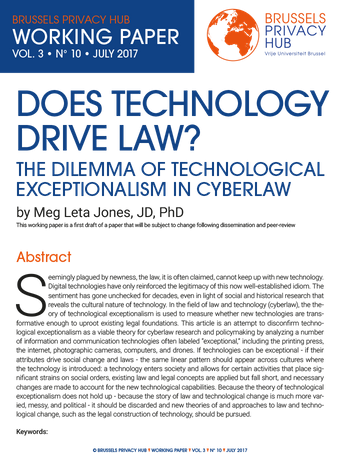Brussels Privacy Hub has moved to a new website as of 18 May 2022. The new website is available at www.brusselsprivacyhub.com. This version of the website will be stored for archiving purposes. Please see the new website for the latest updates.
WORKING
PAPERS
WORKING PAPER • VOL. 3 • N° 10 • JULY 2017
Does Technology Drive Law?The Dilemma Of Technological Exceptionalism In Cyberlaw
by Meg Leta Jones, JD, PhD
This working paper is a first draft of a paper that will be subject to change following dissemination and peer-review
ABSTRACT
Seemingly plagued by newness, the law, it is often claimed, cannot keep up with new technology. Digital technologies have only reinforced the legitimacy of this now well-established idiom. The sentiment has gone unchecked for decades, even in light of social and historical research that reveals the cultural nature of technology. In the field of law and technology (cyberlaw), the theory of technological exceptionalism is used to measure whether new technologies are transformative enough to uproot existing legal foundations. This article is an attempt to disconfirm technological exceptionalism as a viable theory for cyberlaw research and policymaking by analyzing a number of information and communication technologies often labeled “exceptional,” including the printing press, the internet, photographic cameras, computers, and drones. If technologies can be exceptional - if their attributes drive social change and laws - the same linear pattern should appear across cultures where the technology is introduced: a technology enters society and allows for certain activities that place significant strains on social orders, existing law and legal concepts are applied but fall short, and necessary changes are made to account for the new technological capabilities. Because the theory of technological exceptionalism does not hold up - because the story of law and technological change is much more varied, messy, and political - it should be discarded and new theories of and approaches to law and technological change, such as the legal construction of technology, should be pursued.
Keywords:
Connect with us
Brussels Privacy Hub
Law Science Technology & Society (LSTS)
Vrije Universiteit Brussel
Pleinlaan 2 • 1050 Brussels
Belgium
Stay informed
Keep up to date of our activities and developments. Sign up to our newsletter:
Copyright © Brussels Privacy Hub



